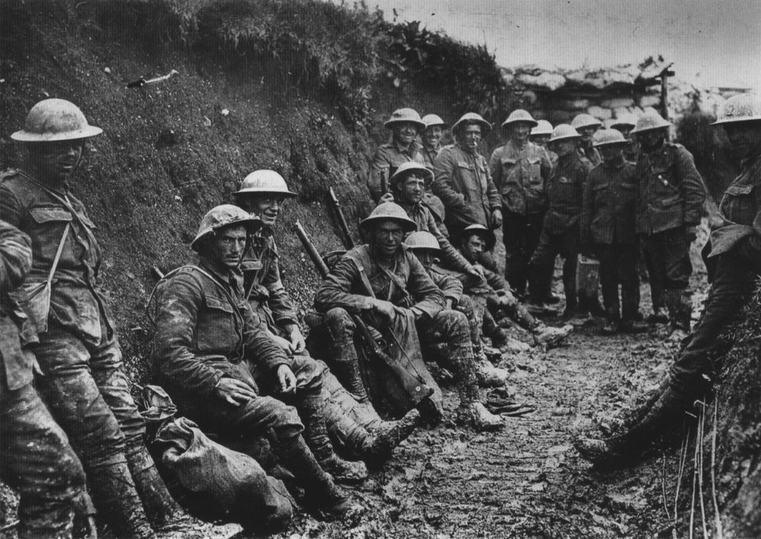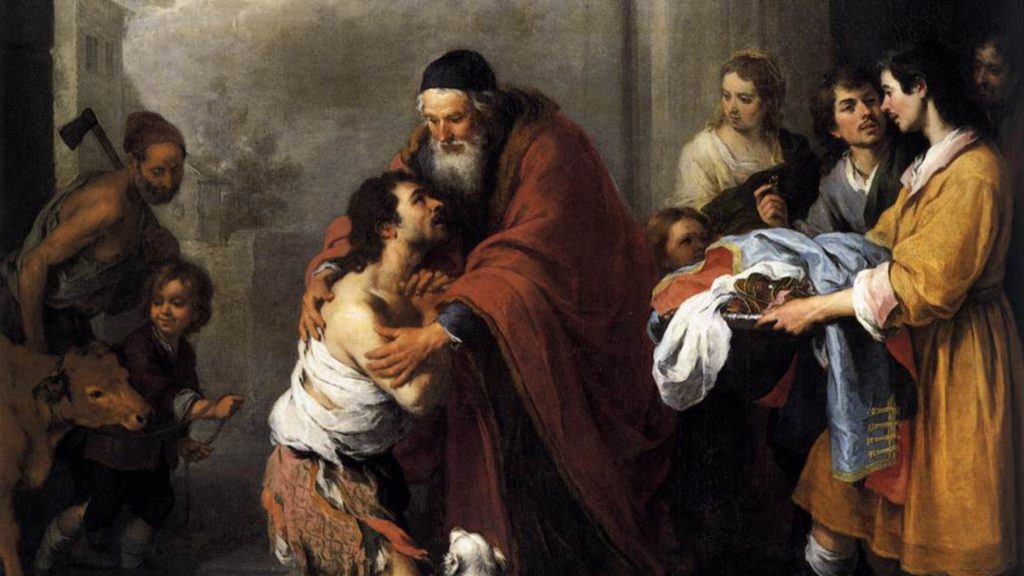Editor’s note: The following is extracted from The Soul of the Soldier: Sketches from the Western Battle-Front, by Thomas Tiplady (published 1918). Tiplady was a chaplain serving with the British Expeditionary Force in France.
The Psalmist of Israel tells us that God has “ordained” the moon and the stars. These “flaming fires” are “ministers of His that do His pleasure.” Nor are they the only ones chosen from Nature. Mungo Park, having laid down in the desert to die, notices beside him a tiny flower, and it awakens hope in him. The winter of his despair is ended. He rises again, and pushes on until he finds a human habitation where he is cared for by native women as though he were their brother. The little flower had been “ordained” to minister hope to a lost and despairing traveler.
At the Front such ministering by Nature is of common occurrence. No Man’s Land is desolate enough to look upon, but there is life there, and music. Larks have chosen it for their nests, and amid its desolation they rear their young. Even the pheasants have taken to some parts of it. If we could but know the thoughts of the wounded who have lain out there waiting for death, we should find that the moon and the stars, the birds and the field mice, had not allowed them die without some comforting of the spirit.
One Sunday our regiment was resting in reserve trenches after a period in the firing line. It was a beautiful evening, and as the sun sank westward I administered the Sacrament of the Lord’s Supper. The day was far spent but, as the bread was broken, there came to us a vision of the Face which the two disciples saw on another such evening in the far-off village of Emmaus. On the way back to my billet I met a platoon of Royal Engineers returning from the baths. One of them had been a member of my church in London, and he dropped out to talk with me. Those who have not been in the Expeditionary Force can hardly understand the pleasure a man feels when he meets someone he knew in the days of peace, or even someone who knows the street or town out of which he came. He was full of talk, and as I listened his excitement and pleasure bubbled over like a spring.
“Last night,” he said, “was the night of my life. I never expected to see daylight again. Talk about a ‘tight corner,’ there was never one to match it, and as you know, my chums and I have been in many. The Huns simply plastered us with shells. The bombardment was terrific. It was like being in a hailstorm and we expected every moment to be our last.
“You know the trench which the infantry took yesterday? Well, we were there. We went up at dark to fix barbed wire in front of it ready for the counter-attack. We were out in No Man’s Land for about two hours, working as swiftly and silently as we could. Whenever the enemy sent his lights up, we laid down, and so far we had escaped notice and were congratulating ourselves that the work was nearly done, and that our skins were still whole. Then, somehow, the Germans spotted us, and let fly. It was like hell let loose. We ran to the trench for shelter, but it seemed as if nothing could save us from such a deluge of shells. It was just like being naked in a driving snow-storm. We felt as if there was no trench at all, and as if the gunners could see us in the dark. After that experience I can pity a hare with a pack of hounds after it. But we just sat tight with such cover as we had and made the best of it. There was nothing else to do. If we were to be killed, we should be killed. Nothing that we could do would have made any difference. Yet, though there didn’t seem shelter for even a mouse, only one of us was hit, and that was the sergeant. He was rather badly ‘done in,’ and we could only save his life by getting him quickly to the dressing station.
“I am one of the taller and stronger men of my platoon so, of course, I volunteered as a stretcher-bearer. There was no communication trench, so we had no choice but to lift him up and make a dash across the open. They were shelling us like blazes, but we dare not delay because, if we were overtaken by daylight, it would be impossible to get him away till the next night, and by that time he would be dead. So we decided to try our luck. We had just lifted him up when a shell burst right on top of us, and knocked us all down. For a minute or two I was unconscious, and when I came round I thought I must surely be wounded, so I ran my fingers over my body but found neither blood nor a rent in my clothes. I was covered with chalk but that didn’t matter. Except for a touch of concussion in the brain I was none the worse, and soon pulled myself together. The sergeant was a sight! He was half-buried, and we could scarce see him for chalk; but we dug him out and got him on the stretcher again. After that we sat down in the bottom of the trench till the effect of the shock had worn off a bit, for we all felt like rats that had been shaken by a terrier.
“Then, as suddenly as it had started, the shelling stopped. The calm that followed was wonderful. I never felt anything so restful before. It was like the delicious restfulness that, sometimes, immediately follows hours of fever. Then, as if to make it perfect, a lark rose out of No Man’s Land and began to sing. The effect on us was magical. It was the sweetest music I have ever heard, and I shall remember it to my dying day. The countryside was dark and silent, and, as I listened to the lark, old days came back to mind. You remember that Saturday midnight in the June before the war when you took us into Epping Forest to see the dawn break over it? Well, as I listened to the lark, I was back there in the forest. Then some impulse seized me and, hardly knowing what I did, I cried aloud, ‘Why bless me, it must be Sunday,’ and so it was, although I had forgotten.
“Then we jumped up for we saw that the dawn was breaking and, lifting the sergeant out of the trench, we rushed across the open ground in the direction of the dressing station. Talk about ‘feeling protected!’ Why, I felt that God was all around us–that no harm could touch us. A great calm stole over me, and I felt utterly devoid of fear. We had, as you know, to bring the sergeant some two miles to the dressing station, just down the road there, but we got him safely in, and I think he will get better.”
While we were talking, a shell burst near the trench where my men had been taking of the Sacrament, and another burst by the roadside close to the Engineers. With a laugh and a hearty “Good-night” he shook hands, saluted, and ran on to rejoin his comrades. The shells were part of the game. In London we had been in the same football team. He had kept goal and I had played full back, and he regarded the shells that had fallen as bad shots at goal made by the opposing team. They might have been serious but, as it happened, the ball had each time gone out of play.
I waited a minute or two in the hope of getting a lift. A motor car came along; I stopped it and got in; for at the Front everything is Government property and more or less at one’s service. I found myself sitting by the side of a private, who had been wounded in the face and right hand by the shell that had just fallen near the platoon of Engineers.
He had left his horse with a comrade, and was being driven to the Advanced Dressing Station by a driver who, happening to pass at the moment, had kindly offered him a lift. After a little wait at the Dressing Station I got on the front of an ambulance car. There were only two cases inside, and they were being taken to the Main Dressing Station in Arras. One of them had his feet and arms tied to the stretcher, for he was suffering from shell-shock; and three orderlies were in charge of him. The poor fellow laughed and cried alternately and struggled to break loose. “I’m a British soldier,” he cried, “and I will not be tied up. I’ve done my bit, and this is the way you pay me out. I’ll not have it.” And time and again he struggled desperately to break away.
The orderlies in charge of him were wise and tactful as women. They asked him questions about the fight, and he fought his battle over again. They praised his regiment and told him it had done magnificently, and he laughed and chuckled like a young mother, dandling her first baby on her knee. And so, without mishap, we reached the ruined town of Arras where nightly the shells fall among the forsaken houses in which our soldiers are billeted. The wounded private was carried into the hospital, and I walked away to my room in an adjoining street.
So ended the day which, in the hour of dawn, the lark had told the young engineer “must be Sunday.”










5